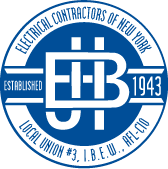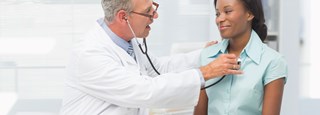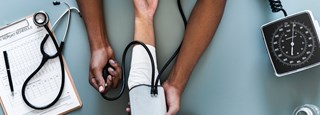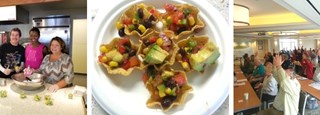Welcome
Welcome to our new wellness website! We hope it will be a very useful resource for all of our participants in the Pension Hospitalization and Benefit Plan.
This is a place for articles I feel will be of interest to you. It will cover many topics. Please let us know at wellness@jibei.com if there is something you would particularly like me to address.
Welcome to our new wellness website! We hope it will be a very useful resource for all of our participants in the Pension Hospitalization and Benefit Plan.
This is a place for articles I feel will be of interest to you. It will cover many topics. Please let us know at wellness@jibei.com if there is something you would particularly like me to address.
This is an exciting and challenging time for medicine, which means there is much to write about.
I’ll start with a brief introduction about myself. I am a long-time professor of medicine at the NYU School of Medicine and a professor at the NYU College of Arts and Sciences. I have seen patients in several specialties, including internal medicine and rheumatology. I have also done considerable research, teaching, and publication on medical ethics and the process and economics of health care.
My greatest interest has always been preventive medicine. It is so much better to stay healthy than it is trying to fight off disease once you are already sick. Currently 95% of medical care is just reactive – something goes wrong and doctors try to fix it. More and more, people are beginning to realize how much better it is to keep things from going wrong and how effective good preventive care can be.
Our concentration here will be about prevention but we will also be interested in all other aspects of medical care.
We hope you find every section of our exciting new website of great value and tell all your friends to check in regularly. We have worked hard to make it easy and fun to use and will be updating information on a regular basis.
This is your website and we very much want your feedback and contributions to make it as useful for you as possible.
Why Medicines Fail
At a recent conference, a leading expert on how to help patients take their medicines, Professor Steven Feldman, discussed why medicines do not always work.
He gave three reasons why medicines fail:
- The patient does not take it.
- The patient does not take it.
- The patient does not take it.
Michael E. Makover, MD FACP, Chief Medical Officer JIBEI
At a recent conference, a leading expert on how to help patients take their medicines, Professor Steven Feldman, discussed why medicines do not always work.
He gave three reasons why medicines fail:
- The patient does not take it.
- The patient does not take it.
- The patient does not take it.
This is similar to why a person starved to death: he did not take food.
Dr. Feldman did many studies of why people fail to take or keep taking needed medicines. They rigged pill bottles with electronic monitors that would record if and when the patient opened it to take out the pill. The results were startling in many different cases. People took medicine irregularly for many reasons, and most lied to their doctors when reporting what they took.
Who gets hurt when you fail to take medicines or do so incorrectly? You do! The doctor feels bad for you and frustrated by seeing you not do as well as you should, but you are the one who suffers.
There are many reasons people do this. Just reading this might influence some people to stop their medicines because unconsciously we all tend to copy what others do. A psychologist at Duke, Dan Ariely, wrote a best seller called Predictably Irrational. He showed with scientific evidence how we all tend to act instinctively, often against our own best interests.
Making illogical decisions doesn’t matter much when deciding what show to watch on TV or which pair of socks to wear that day, but when it comes to health, making good decisions can determine your health and even your survival.
No one wants to take medicines unless they really need them, and doctors prescribe them only when truly required, but it makes no sense at all to avoid medicines that have been carefully evaluated for need and safety for you.
You’ve hired an expert – your doctor. It seems a much better idea to discuss it with him or her instead of listening to rumors, well-intentioned friends and the huge amount of misinformation on the Internet and in many books and articles. It seems a much better idea to take your medicines if your doctor has given you good reasons to and answered your concerns.
Even when you want to, it takes organization and dedication to ensure that you are doing everything right, following up as needed and keeping track of how you do. We are all overloaded today, flooded with excess information and pulled in so many ways. Yet difficult as it is, to get the results you want you need to find the will and the way to keep yourself on track to do the best that you want.
Medicines do not work if you do not take them or if you take them irregularly or incorrectly. It is always your decision, but also your problem if you get it wrong.
The Fierce Urgency of Now
Michael E. Makover, MD FACP, Chief Medical Officer JIBEI
That wonderful phrase is from Martin Luther King, Jr. He was not only one of our greatest leaders, but among our greatest writers. He fought for all Americans, not just those of color, since we all suffer in an unjust society.
I had met Dr. King and just about all of the other civil rights leaders when I was active in the movement. You could not miss their incredible passion for justice.
Michael E. Makover, MD FACP, Chief Medical Officer JIBEI
That wonderful phrase is from Martin Luther King, Jr. He was not only one of our greatest leaders, but among our greatest writers. He fought for all Americans, not just those of color, since we all suffer in an unjust society.
I had met Dr. King and just about all of the other civil rights leaders when I was active in the movement. You could not miss their incredible passion for justice.
They had been told all their lives that fairness would come if they just waited a little longer. Dr. King’s fierce urgency of now was his answer, that they could wait no longer, that now was the time, long overdue. Lives and justice were at stake. Because of those pioneers, things are better now, though still not good enough.
Passion is essential for all of us to achieve our own most important goals, only in our case, for most of our goals the biggest challenge is ourselves.
Few of us live perfect lives, especially when it comes to health. It is human nature to be imperfect and, far too often, to be less than fully rational about how we lead our lives.
Procrastination, putting off what we know we need to do, plagues us all. If we delay mowing the lawn or catching a movie we’d really like to see, there is little risk.
When we delay important health issues, we can lose that which is vital to our lives – our health.
There are many reasons why changing ourselves is difficult, but when the stakes are very high, excuses are too costly.
If your cholesterol is too high, if your belly is getting bigger, storing up more and more of the very harmful excess fat that causes so many diseases, if your blood sugar or blood pressure are getting higher, if you are still smoking or still drinking in excess, each day you delay eats away a little more and more of your health.
- Each day you do not lower your cholesterol, your arteries can get slightly narrower.
- Each day your blood sugar is high, you can lose some more cells in your pancreas that make insulin needed to keep blood sugar normal.
- Each day your blood pressure is too high you can lose a little more kidney function.
- Each cigarette or cigar you smoke destroys a little more lung tissue and can move you a little closer to one of many different cancers.
Enough such days and you will lose what you value most – health and vigor to enjoy your life as you choose.
As Shakespeare’s Macbeth said,
Tomorrow, and tomorrow, and tomorrow,
Creeps in this petty pace from day to day,
To the last syllable of recorded time
Tomorrow too often never comes because there is always another tomorrow after that to delay to.
I hope you have the same intense passion for your life that Dr. King had for all of ours.
We are all the absolute rulers of ourselves, but life throws many challenges in our way. It takes a powerful passion to succeed to overcome them, but because you control you, you cannot fail if you are fully driven and committed to doing so. You should love yourself enough to act now.
The anthem song of the civil rights movement said, “We shall overcome some day”. Some day is too long when your life is involved, just as it is for justice.
Overcome in the fierce urgency of now!
Act in the fierce urgency of now!
The life you save will be your own.
Why Smokers Should Be Angry
Michael E. Makover, MD FACP, Chief Medical Officer JIBEI
Hollywood and television depict smokers as cool and heroic
– Smoking is neither! You can decide for yourself!
Hollywood has been a major pusher of addictive substances and anyone who has been sucked in by its glamorizing of tobacco, alcohol and drug use should be really mad about it.
Tobacco in any form is as cool as lung cancer, throat cancer, emphysema, mouth cancer, heart attacks and strokes, smoker’s face, dozens of other cancers and so much miserable else they can do to you. Smoking anything and any other tobacco use are the deadliest things you can do to yourself other than jumping off a bridge or shooting yourself in the head. The only difference is those two are faster. Nicotine is one of the strongest addictive agents there is.
Michael E. Makover, MD FACP, Chief Medical Officer JIBEI
Hollywood and television depict smokers as cool and heroic
– Smoking is neither! You can decide for yourself!
Hollywood has been a major pusher of addictive substances and anyone who has been sucked in by its glamorizing of tobacco, alcohol and drug use should be really mad about it.
Tobacco in any form is as cool as lung cancer, throat cancer, emphysema, mouth cancer, heart attacks and strokes, smoker’s face, dozens of other cancers and so much miserable else they can do to you. Smoking anything and any other tobacco use are the deadliest things you can do to yourself other than jumping off a bridge or shooting yourself in the head. The only difference is those two are faster. Nicotine is one of the strongest addictive agents there is.
Every smoker has the right to be really offended by the crass profit-seeking that drives selling stuff that is highly dangerous when used as directed. Smokers are almost always hooked in childhood and once caught, it is among the hardest addictions to break, though fortunately millions of people have.
How do they catch the young and innocent in their evil nets? By giving away free cigarettes (like dope pushers on a playground). They are not supposed to do that anymore, but they can still create images and ads, sponsor sporting events, flavor and adapt the cigarettes to be more alluring to young people and pay movie and television producers to push their products in ways it is hard for younger people to resist.
10.5 billion doses of poison
Every puff of tobacco smoke contains over 7000 poisons, none good for you, all really bad for you, including plutonium, radiator fluid chemicals, arsenic, carbon monoxide, and countless cancer-causing agents. The only reason they do not kill you quickly is the way you absorb them. Were you to mainline the ingredients of a cigarette, it would probably kill you within seconds. In twenty years of smoking a pack a day (or the equivalent in cigars), a smoker takes in 10.5 billion doses of poison, which damage every part of your body. At current prices that would also mean having to earn more than $120,000 to purchase them over those two decades. Cigar smoke contains even more poison than cigarettes and is just as deadly. A single cigarette or cigar smoked at a vulnerable time can cause an immediate heart attack or stroke.
Addictions are tough
Why do people keep smoking? Very few have, compared to the past. In the heyday of smoking, as shown on Mad Men on television, probably between 50 - 70% of adults smoked. Today it is around 17%, though that is still far too many (zero is the right number). Those still smoking, despite the health risk, high cost, social isolation and need to stand outside in any weather to do so, are likely those who are the most addicted. They are all good people, our friends and neighbors, who were hooked by lies when young and are now trapped in the grip of nicotine, one of the most addictive drugs known (some heroin addicts report it is harder to quit tobacco than heroin). Logic and necessity do not work for these kinds of addictions.
It is not hopeless
Is it possible for a smoker to become a non-smoker again? No one comes out of the womb with a cigarette dangling from his or her mouth, so everyone starts out as a non-smoker.
Most smokers get hooked by age eighteen, led into it by friends, movies and television shows that make it look glamorous and by tobacco company marketing, as above. Nothing heroic or sexy about smoking yourself to death, getting horribly sick along the way. The real stars are the smokers, essentially all of whom are fighting to get free.
Can someone become a non-smoker again? Sure. Hundreds of millions of people around the world have done so. JIB Medical will be happy to help anyone in our Plan who is interested in learning more and becoming a non-smoker. Health Advocate offers a smoking cessation program sponsored by your Plan (866-799-2723).
For those so addicted to tobacco they cannot stop, there is an interim solution. Since nicotine is the driving force, nicotine products are available as a substitute for the tobacco itself.
Nicotine without the smoke
Is nicotine safe? Of course not, but which is better - nicotine alone or nicotine plus 7000 poisons? You can now get plain nicotine as gum, patches, lozenges, drops and inhalers. Hopefully it is just a step to getting off the nicotine as well, but sure better than breathing in smoke, which, after all, every fireman knows is the primary cause of death in fires. Nicotine in these forms is about as safe as nicotine can be, at least compared to smoking.
Are e-cigarettes a safe substitute?
Not very likely for most, and they are full of additives and have other risks. Please see our separate article on them (“E-cigarettes are e-awful”). They are probably safer than tobacco (what is not?), but too many keep smoking even when using them.
So what about cigars? Aren’t they safer? Heck, no!
Cigars are even worse in many ways – they contain a lot more tobacco and are even higher in nicotine. The leaf wrappings also trap more inside to get to you in the smoke. All previous cigarette smokers inhale cigars even when they are sure they are not, as many studies have proven. They are just as bad as or worse than cigarettes and can be just as addicting for many people.
Even if you do not inhale, though most do, they are a major cause of mouth cancer. Sigmund Freud, the father of psychoanalysis, died of mouth cancer from his cigars. He went through nine operations, progressively losing more and more of his jaw and face and still could not stop smoking them until near the end. You can be better than Freud and stop before suffering like that!
Snuff and chewing tobacco are not safe either. A teenage chewing tobacco user lost half his face to cancer at age eighteen! Pipe tobacco is also very bad.
The only safe tobacco is zero tobacco.
What is a Healthy Way to Eat?
Michael E. Makover, MD FACP, Chief Medical Officer JIBEI
A healthy way of living is one where you are active everyday, you learn to enjoy foods that make you healthy rather than the ones that make you sick, you do not poison yourself with tobacco and other addictive substances that are alien to healthy human bodies, and that you learn to handle life’s challenges with less extreme emotion.
Michael E. Makover, MD FACP, Chief Medical Officer JIBEI
A healthy way of living is one where you are active everyday, you learn to enjoy foods that make you healthy rather than the ones that make you sick, you do not poison yourself with tobacco and other addictive substances that are alien to healthy human bodies, and that you learn to handle life’s challenges with less extreme emotion.
Healthy eating is fairly simple
- Whole grains provide excellent nutrients and fiber and are not hard on your blood sugar as are simple starches (white flour, white rice, white potatoes).
- Vegetables, fruits, legumes (like beans) and nuts are chock full of wonderful nutrients that actually reduce risk of heart disease, cancer and much else. They also supply important fiber needed for good health and well-functioning bowels.
- Monounsaturated fats are by far the best kind for healthy arteries. Olive oil, canola oil, white meat of chicken and turkey, fish and most nuts are high in these.
- Polyunsaturated fats are pretty good for you, but not in excess. Safflower oil, corn oil and others commonly used because they are cheap and easy to cook with should be used in real moderation.
- Omega 3 oils are also good to your arteries and the rest of you. They are high in fish and some plants.
- Omega 6 oils, found in vegetable oils like safflower and corn are good but only on modest amounts.
Saturated fats and trans fats are the worst for your arteries.
- Saturated fats are found in high levels in dairy fat of any kind (milk other than skim milk, cheese, butter), all red meats including pork and bacon, and palm, palm fruit and coconut oils (do not believe the current hype that somehow coconut fat is good for you – it isn’t!). You need some saturated fat, just not very much, and far, far less than most Americans consume every day.
- Trans fats hardly exist in nature and they are really bad for your arteries. They occur when fats are ‘partially hydrogenated’. The food industry gets away with saying “0 trans fats” when actually the food does contain some, so the best thing is eat nothing that has the words ‘partially hydrogenated’ on the nutrition label list of ingredients.
Salt and sugar. Like most things in life (but not all, tobacco for example), moderation is the key.
- Cooking with salt is sometimes needed for most things to taste good, but it can add huge amounts of sodium without your realizing it, especially in soups, sauces and much American Asian cooking. Better to cook with less or select low-salt versions and then add salt to your taste after it is cooked, because you cannot add too much without making the food inedible. Despite sales hype, salt is salt and no type is better than another as far as your body is concerned.
- Sugar is not evil, but excess sugar is not good. In small amounts sugar certainly enhances life, but in excess it adds huge calories but no nutrition. It plays havoc with your blood sugar and often induces you to eat much more than you planned or need. All sugars are basically the same in the way your body uses them. Honey and maple syrup at least have a bit of other nutrition in them, but are very high calorie.
Spices and condiments. Most spices just add flavor and are great to use. A few, such a cumin and cinnamon probably have some health benefits, but that is hard to prove. Condiments also add little fat or calories unless added. Studying the label is always important to separate the ones you can use freely from the ones you need to be more careful about.
Processed foods
- Fast foods, packaged foods and others are made in factories, are chemically altered in many ways and are full of additives. For many of these there is little real food left, little good nutrition, and the additives are unnecessary and perhaps bad for your health.
- They are also carefully engineered to make you eat too much (which means more money for the makers).
Calories
- Too many make you fat, regardless of what food you eat. The worst fat is visceral fat, which is hidden inside your belly and other areas where you cannot tell how much is there. Visceral fat is one of the major causes of cancer, heart disease, diabetes and arthritis of the hips and knees.
- There is no magic – take in more calories than you burn up each day and the excess will be stored as fat. Take in fewer than you need and your body will start to use up the stored fat (though it adjusts a bit before doing that).
- ‘Empty calories’ means foods that are very high calorie but have few nutrients along with them.
- It is not the size of the portion but the number of calories it contains. A pound of tomatoes is 90 calories and a pound of chocolate chip cookies contains 2500 calories!
Strike Out Stress! SOS
A new program at JIB Medical helps you cope with everyday stress
Stress – we all have it, no one likes it and everyone struggles to cope with it.
Good news – help is at hand!
JIB Medical has developed a new, easy and enjoyable program open to all participants that will help you understand stress, recognize when it is affecting you and teach you how to help reduce and manage it.
A new program at JIB Medical helps you cope with everyday stress
Stress – we all have it, no one likes it and everyone struggles to cope with it.
Good news – help is at hand!
JIB Medical has developed a new, easy and enjoyable program open to all participants that will help you understand stress, recognize when it is affecting you and teach you how to help reduce and manage it.
What is stress?
Stress seems a little mysterious, like an outside force that grips us. Actually, it is a choice that we make, often out of habit. The great news is that anything you choose you can choose differently and any habit you learned can be unlearned.
One kind of stress is what we feel when bad things happen to us. Life can be quite painful at times, but we get to decide just how much it affects us.
The most common type of stress is when we feel anxious, angry and depressed about something we fear might happen but has not yet occurred. It is human nature to think about the future. Planning ahead and considering what to do if things go wrong is very sensible. On the other hand, agonizing about things that have not yet happened and very likely will not causes us unnecessary damage, distraction and unhappiness.
The good news!
We can learn to break the stress habit and to find much more satisfying and effective ways to deal with life’s challenges. The SOS Program is designed to do just that and it works for every kind of person.
While most people do not realize that stress is a choice, anyone can learn better ways to deal with the many strains and problems of everyday life. The choice is always yours.
We do not realize how much the small stresses we experience daily can drag us down, exhaust us, affect our enjoyment of life, sap our energy, lead us to poor decisions and even damage our health.
Even when bad things actually do happen, we can learn to make better choices of how we cope with loss, difficulty, conflicts and all the rest that sadly punctuate our lives.
The SOS Program at JIB Medical can change how you think about stress
Our SOS Program at JIB Medical is conducted by Dr. Mariusz Mikulec, who has been performing acupuncture at JIB Medical for many years. He has come on staff full time to add stress-relief training to his acupuncture service. He is highly trained and experienced in the scientifically well-founded techniques of stress management.
Stress coping techniques include Mindfulness, Meditation, Relaxation Training and more (acupuncture is a separate service and not part of SOS). All are easy, pleasant and do not involve anything you need to ‘believe in’ – nothing religious, unusual or difficult to understand. All are straightforward and common sense. People from every walk of life, every age and every background have found them invaluable.
These techniques are now part of mainstream medicine, and all have been proven effective by multiple scientific studies. All are being used by medical schools and major medical centers and have also become very important in other fields, including psychology, substance abuse and more.
The SOS Program is invaluable for three situations:
- Pretty much for every one of us – we all struggle with the stresses of everyday life, without even realizing they are affecting us. Managing stress better helps makes life better. The stress you may not even realize is happening can greatly limit your enjoyment and success in life. Once you learn to control it, you can discover how much better you feel.
- For others for whom stress affects them much more than average and they struggle to cope. They can learn excellent techniques to reduce their stress much more effectively.
- Some have fallen into ‘self-medicating’ their stress with tobacco, alcohol or other drugs and would like to find a much better and safer way to cope with the problems they are trying to cover up with substances that hurt their mind and body. Stress management might not eliminate the problem by itself, but certainly can help move you along the road to success. Our MAP Program, under Dr. John Krachenfels (718-591-2000, ext. 1396), can also greatly help you in these areas if you’d like and can coordinate with our stress management program.
How it works
The SOS Program currently includes two sessions of one hour each (acupuncture is a separate program and requires a separate appointment). All you need to bring is you and a desire to learn how to relax.
If you are interested, please call (718) 591-2014 for more information or an appointment.





